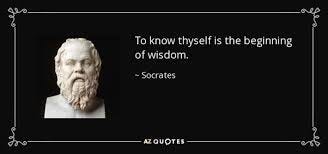Know thyself
When you catch yourself acting like your mother, especially doing the very things that she did that you didn't like, it's kind of unnerving, isn't it?
When people have this kind of experience they can laugh, blow it off, deny or minimize it, and do an honest appraisal and decide how they would like to do things differently.
Murray Bowen, the father of family systems theory, called a person's ability to do this "Differentiation of Self" meaning that the person becomes consciously aware of how they can choose to have different thoughts, feelings, preferences, and practices than the people and group with which they identify. At this point the person comes into their own, stands on their own two feet, and takes responsibility for their own functioning rather than just being blindly influenced by the beliefs, values, and practices of others. Sometimes we refer to the person's degree of DOS as "maturity." In spiritual models, the part of the person that is able to nonjudgmentally observe one's own functioning is called "the witness."
The witness is more highly developed in some people than in others. The ability to which a person can nonjudgmentally observe their own functioning is directly related to the person's level of mental health.
AA is one of the most accessible and successful programs for spiritual development in the world. The greatest benefit from the program for people who work the program are the 4th and 10th steps.
The advice of the Oracle at Delphi which has stood homo sapiens well for millennia is 'Know thyself."
The first skill of 21 in Cindy Wigglesworth’s model of Spiritual Intelligence is the ability to describe and monitor one’s own world view. Wigglesworth suggests that we rate as low, medium, or high the extent to which we can explain to others the impacts of one’s upbringing, one’s culture, and one’s thought system on their personal identity and the way they see the world.


